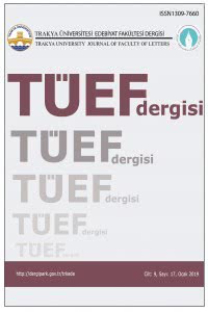CARLO GOLDONI VE LOKANTACI KADIN ADLI YAPITINDA TOPLUMSAL ÖGELER
İtalyan tiyatro geleneği Avrupa tiyatro kültüründe önemli bir yere sahip olmakla birlikte
Anahtar Kelimeler:
Goldoni, Commedia dell’arte, tiyatro, XVIII. yüzyıl, Lokantacı Kadın
SOCIAL ELEMENTS IN THE MISTRESS OF THE INN OF CARLO GOLDONI
The tradition of Italian theatre does not only have a significant place in the tradition of European theatre and also has affected the improvement of the art of theatre with the reform taking place at Commedia dell’arte in 18th century. Carlo Goldoni, living in the 18th century, became the pioneer in accepting the changes by implementing these revolutionary changes in theatre. With his works, he brought fundamental changes to the tradition of theatre, in other words, he made a reform. In The Mistress of the Inn, one of his pre-eminent works, it is possible to see the values of that century, which are to be represented, to live in justice and to support equality for different people from different walks of life, and these values are the most fundamental virtues of the Enlightment. The protagonist of the work is a woman and this becomes successful in going beyond the notion of the era with this important aspect. In addition, particularly with the protagonist and with the other characters, the aristocratic class are criticized and bourgeois class, people dealing with trade and people becoming rich are praised. Because bourgeois society makes fun of with backwardness of the aristocratic class by using their mind. This work does not only include sociological elements but also includes the virtues and novelty which Goldoni contributed to the art of theatre as a reformist theatre that has a text, fluctuant characters and has no masks.
Keywords:
Goldoni, Commedia dell’arte, theatre, XVIII. Century, The Mistress of the Inn,
___
- Balamir, Ebru, “İtalyan Aydınlanmasının Ünlü Tiyatro Yazarı Carlo Goldoni ve Tiyatro Reformu”, Batı Kültür ve Edebiyatlarında Aydınlanma ed. Battal Arvasi. Ankara Üniversitesi Basımevi, Ankara, 2013.
- Balamir, Ebru, “Commedia Dell’arte, Tiplemeler ve Carlo Goldoni ile İtalya’da Tiyatro Reformu”, RumeliDE Dil ve Edebiyat Araştırmaları Dergisi 2017/9, 2017, 81-88.
- Emery, Ted, “Goldoni's Pamela from Play to Libretto”, Italica, 64(4), 1987, 572-582.
- Fido, Franco, Guida a Goldoni Teatro e società nel Settecento, Giulio Einaudi Editore, Torino, 1977.
- Fido, Franco, “Goldoni oggi”, Italica, 83(3/4), 2006, 707-716.
- Goldoni, Carlo, Lokantacı Kadın, Türkiye İşBankası KültürYayınları, İstanbul, 2015.
- Heartz, Daniel, “Goldoni, Don Giovanni and the Dramma Giocoso”, The Musical Times 120(1642), 1979, 993-998.
- Lukács, Georg, “Lo scrittore e il critico”, Sociologia della Letteratura ed. Alfredo Luzi, Mursia, Milano, 1977.
- Nutku, Özdemir, Oyunculuk Tarihi, Yapı Kredi Yayınları, İstanbul, 1995.
- Öncel, Süheyla, İtalyan Edebiyat Tarihi 2. Kitap,İtalyan Kültür Heyeti,Ankara,1998.
- Parini, Giuseppe, Il Giorno, Feltrinelli, Milano, 1980.
- Rho, Edmondo, “Carlo Goldoni”, Letteratura Italiana I Maggiori ed. Carlo Marzorati, Dott. Carlo Marzorati, Milano, 1956.
- Suner, Levent, “Commedia Dell'Arte Etkisinde Üç Oyun Beş Yorum”, Tiyatro Araştırmaları Dergisi 24: 2007, 145-182.
- ISSN: 1309-7660
- Yayın Aralığı: Yılda 2 Sayı
- Başlangıç: 2011
- Yayıncı: -
Sayıdaki Diğer Makaleler
KIŞ UYKUSU’NDA SIKINTI ÜZERİNE
Elif GEZGIN, Argun Abrek CANBOLAT
CHINUA ACHEBE’NİN PARÇALANMA (THINGS FALL APART) ADLI ESERİNDE KÜLTÜREL KİMLİĞİN BOZULMASI
Şule OKUROĞLU ÖZÜN, Nagihan BAŞKALE
ÇEVİRİ GÖSTERGEBİLİMİ EKSENİNDE ÖZGÜN METİN OKUMA VE ÇÖZÜMLEME MODELİ İLE ANLAM ARAYIŞI
TÜRKİYE TÜRKÇESİ AĞIZLARINDA YER-YÖN BİLDİREN İFADELER
AÇLIK OYUNLARINI KIM OYNUYOR: ARTEMIS MI PERSEFONI MI? SUZANNE COLLINS’IN ÜÇLEMESINDE PERSEFONI MITI
FAKRU’D-DEM TERİMİ VE KLASİK TÜRKÇE TIP METİNLERİNDEKİ EŞ ANLAMLILARI
Fast Forwarding with Audiovisual Translation
CARLO GOLDONI VE LOKANTACI KADIN ADLI YAPITINDA TOPLUMSAL ÖGELER
